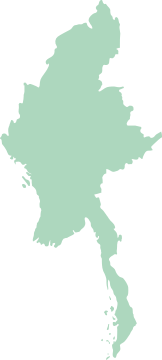MYANMAR

RICE BIO PARK IN MYANMAR
Traditionally, Myanmar was doing well in agriculture. In fact, before World War II, we used to get rice from what was then called Burma. I remember the Burmese rice was highly appreciated even in our own families in Kumbakonam and Moncompu. But gradually agriculture went down in their country, they became deficit, and there was lot of undernutrition and malnutrition. So in the case of Myanmar, again as part of India’s collaboration with the country, I suggested two programmes: the first, an Advanced Centre for Agriculture Research and Education (ACARE), for research and training in agriculture in collaboration with IARI. The second programme was to develop a Rice Bio Park to show farmers how to increase their income through biomass utilisation. Value-added products will be prepared from the rice straw, husk, brawn and grain. MSSRF has developed a Rice Bio Park in Yezin, Nay Pyi Taw. Dr Pillaiyar, formerly of CFTRI, is helping us with this. We have sent a couple of our senior scientists to go there and stay there and help them build the centre. The Rice Bio-Park will fetch more money to the farmers, more income, more jobs and more products of importance, like the rice bran oil which is very good oil.
In 2013, I called on Aung San Suu Kyi along with our Ambassador to explain the work we were doing in her country. She immediately explained that agriculture being the most important source of livelihood for a majority of people in Myanmar, any help given in the field of agriculture will be very warmly welcomed. The Rice Bio-Park is in the final stage of establishment and I am confident that the Bio-Park and ACARE will enhance meaningful collaboration between our two countries.
There is an interesting story about my visits to Myanmar. When I was in IRRI, I used to go to Myanmar because it was an important centre for rice production. On one of my visits, I met the then President, they were all army officials at that time. I told him that the country’s enormous genetic resources in rice are getting lost due to the Karen insurgency and that efforts should be made to collect and preserve them. The President agreed with me but said it would be too dangerous for IRRI staff to go to the rebel areas to train people. Instead he had several army personnel brought to Rangoon, from generals to lieutenant colonels, captains and so on. We sent Dr. T.T. Chan and two or three other people from IRRI to give them training on how to collect and conserve genetic resources. The army men did a very good job; they collected over 1000 strains of rice. They sent them to IRRI, and we classified them.
So, the experience with Burma (Myanmar) has been always very good.

 M S Swaminathan Research Foundation
M S Swaminathan Research Foundation Phone :
Phone :